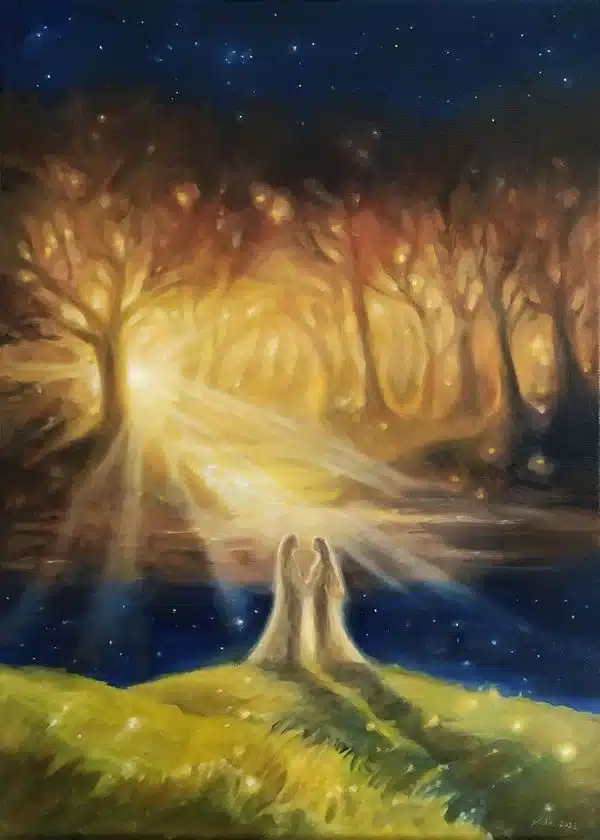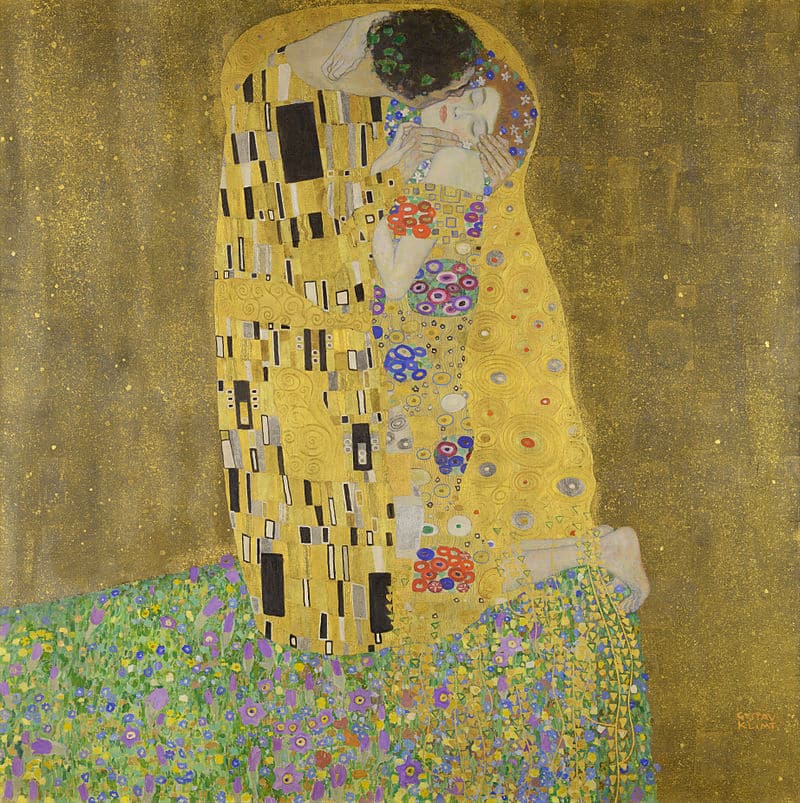‘Twas on the borders of Elfland that they met, and this was but the first and the least of the many wonders in their tale. For she was dreaming under a rowan tree when he came swift and soft upon her; and she was wrapped in slumber and crowned with flowers upon her dusky hair. Then startled he cried at this fleeting vision of loveliness and she woke! and saw him elfin-bright, clad in green and of noble bearing, and there was a song in his smile and his feet were light.
And she would have fled, but his eyes pled that she stay, and in faltering tones did he beg her leave that she might walk with him awhiles under the golden trees, and so charming was his speech, and so earnest his plea, that she assented (and assent did she not give unwillingly, for he was proud and fair, and yet his speech was fairer still).
Then did they walk, this way and that, under bough and over brook, and they spoke soft together, and were ever in amaze at the marvels that they did chance upon. With wonder they passed by dwimmer glades, and in fear did they hear the cries of haunted night terrors. And they walked far and deep into Elfland and away from it, so that both her home and his became strange-mingled and the joys and sorrows of each were blended into the same heady brew, from which they drank long and deep.
Towers they scaled of living crystal, and to the roots of the mountains they delved, where blind things crawl amid palaces of gems sunless glittering ‘neath soaring ceilings of stone slow-living. Songs they heard of the days when things were fair, and long into the night they danced in moonlit dells and on the bare backs of hills. To halls they came of gold and chalcedony, where heroes sleep and young kings brood, and with fine words were they greeted by poets and sorcerers who marked them with high regard, for they were beautiful and free.
They sailed the Sea of Glass, and dared bone-littered deserts where raiders roam. In cities of ice they tarried, and by fields of flowers they flitted. And those who did see them pass were themselves stricken with wonder, and a fierce joy gripped them, and the melancholy that fell in the shadow of their departure was all the keener for that joy with which they had been pierced.
Many were the glorious and the alluring sights that they did see, as they walked awhiles, but never did either one of them see a sight fairer than that of their companion; and yet all the other wonders were themselves heightened by her fairness and his beauty. And they were glad, and their hearts soared, and all was well.
Then sudden she stumbled, and trembling he caught her and gentle lowered her to the green earth, and he gasped, for her hair was white and her eyes dimmed by the sights of many long years. And as her heart fluttered in her breast, seeking escape, she spoke to him. Much had they spoken, once upon a time, but less so these past years, for each knew the mind of the other.
And she said, “It is gone, my love. The joy of Faerie has slipped my grasp, and it escapes my sight. Go! leave me, for I am spent, and you are young.”
And he wept and fain would he have railed against his gods, but he knew now the urgency with which the minutes passed. So he said, “Leave you? Nay, my dear. Of this cup have we drunk together, and I will not flee when the bitter dregs rise.”
And she said, “Then so it is, though it is a strange chance. For you, lofty and fell as you are, to have been ensnared so by me, a mere mortal fool.”
And with laughter he said, “Think you so? Then aye, you be yet more foolish than even I. For of all my foolish deeds, I count my stirring of your slumber under that rowan tree the least foolish I ever did do.”
She sighed, and her eyes closed, though breath fluttered upon her lips. “Then I am full-gladdened, and yet also grief-laden,” she said. “For if any ill-thought has troubled me these past years, it was that for I, this time means other than it does to you. You are fey and fierce and youth-full, and never did I know how many maidens had you entranced from slumber.”
And he pressed her hand to his lips, and he was trembling. “Say not so,” said he. “For my part, ever have I thought my rousing of you to have been the greatest of my many selfishnesses, to have thoughtless stripped your years from you in my jealous company.”
“No greater gift could I have been granted,” said she, and a silence fell upon them.
“Strange,” said he, “that you should perish so and yet I linger. I know not if Death ever shall visit my kind, but now I wish it might. For I would not live without your company.”
“Say not so,” she said in answer. “Live! Be free! For my part, were it permitted, forever would I dance with you under shadow and under sun, for ‘tis but my body that is worn, and my spirit yet hungers. But light shall my passing be, if I but know that you shall see those things for me, and do those deeds I would have done.”
But to this he could not or would not answer.
Slow now fell the golden leaves from the weatherworn trees, and as they danced and dropped dying to the cold earth, he said, “‘Tis no small wonder, for one of your kind to have stepped true in Faerie for so long. You guess aright. Companions have I had before on my many roads. But never one who saw so keen nor lingered so long. Yet only now, at its end, do I mark the marvel of it.”
And she said, “And yet I feel it dimming swift already, and not for my own want. Ever would I tread those paths, yet I am weary of them, and in spirit not the least.”
“Can it be so?” asked he. “That one should love a thing and yet weary of it?”
“It can,” she said.
And this he counted strange, yet even as she spoke, he understood. But still did weariness not enter his own thought, and he was the bitterer for it, for still fierce did he burn for her. But he said, “Then I cannot begrudge you. If weary you be, then slumber you must have.”
And she said, “And yet I begrudge it, for I would not have it so.”
“Nay,” said he. “I would not have had it other. If it is to be a high price levied for a high joy, then so be it. And such joy have I never known, though I am old.”
“And such joys could I never have hoped for, though I am young,” she said.
He looked upon her, and smiled, for so she was. “Young, and yet unafraid, as ever you were.”
“I was unafraid?” she laughed. “Maybe! For I knew not fears, til this moment struck. But now, I am blind, and the way is unlit. And I do not know where next my foot shall tread.”
“It will tread where you will,” he said gently. “For ever has it been so, and you go this way now not unrightly. Go! and be bold in the going.”
“But I would tread with you,” she said. “And that now is barred to me.” And again, he did not answer, and his face was troubled, as before him he saw many long miles stretching to the very ruin of the world; and so long as his face remained turned from her would those miles be barren of joy and grief alike.
Then she said, “I am cold.” And he marked that a chill was upon her brow.
“‘Tis but the approach of evening,” said he, and he spread his cloak upon her.
“Aye,” she said. “But there shall be no morn.”
“Ever the morn comes,” said he.
“Nay,” she said. “Ever do we hope for its coming, but never is it a sure thing.”
“And yet it comes,” said he. “Even against hope.”
But she said, “It comes for some. But to linger in night is no bad thing, for the night is fair.”
“It is,” he said. “Fair, and full of stars.”
And she looked to him, and her heart was moved to pity, and she said, “It is no bad thing, to dwell in the night and yet have seen the light of day. Go! dwell in the sunlight, but remember me, tarrying in shadow.”
And then she passed, and long he wept, and ever after was that place marked by grief. Then he buried her, and the soft mosses and blue flowers that ever she had loved crept over her mound, and were fed with his tears. And so he turned, and left, and never again did he come to that place, for it lived in his heart and he did not forget the memory of it.
If ever they met again, the fey-prince and his mortal maid, this tale does not tell, and I do not know. But stranger things have come to pass in this world and in others that remain yet hidden from even my sight, and maybe it shall be that one day they shall walk together again, in the glades that they so loved.

~~~~~~~~~~~~~
Thanks for reading – feel free to check out anything else you may be interested in on the blog, there’s plenty more to discover! Follow me on Facebook and on Twitter to stay up to date with The Blog of Mazarbul, and if you want to join in the discussion, write a comment below or send an email. Finally, if you really enjoyed the post above, you can support the blog via Paypal, and keep The Blog of Mazarbul running. Thanks for reading, and may your beards never grow thin!
